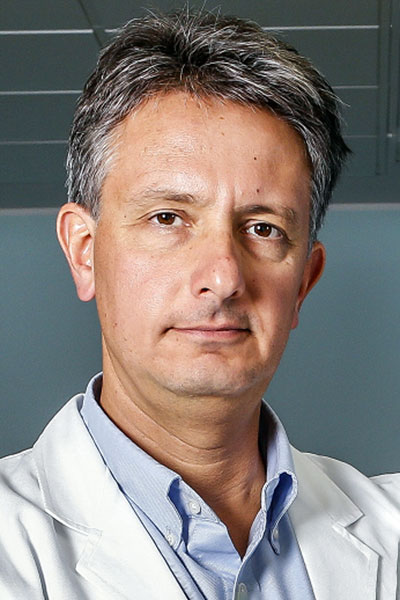Third Plenary Session to focus on the role of technological advances
Technological advances in biology, chemistry, and other domains are redefining what’s possible in cancer care, and the third Plenary Session at the AACR Annual Meeting 2025—Innovative Technologies Driving Advances in Cancer Research—will examine the current impact and clinical potential of several promising approaches.
The Plenary Session will take place on April 28, 8-10 a.m. CT, in Hall B1 of McCormick Place North (Level 3).

“Our ability to interpret the biology of human tumors is spearheaded by transformative technologies that are central to further progress in cancer diagnosis and treatment,” said Plenary Session Chair Alberto Bardelli, PhD, of Istituto Fondazione di Oncologia Molecolare (IFOM) in Italy and the University of Turin Medical School.
Monday’s plenary platform will present four technologies helping to chart new horizons in oncology by advancing our understanding of cancer and developing better therapies for patients.
“Whether you are a cancer biologist or a treating physician, staying up to date on new technological platforms is a must, and central to the next round of fundamental discoveries to improve patient outcomes,” Bardelli emphasized.
Matthias P. Lütolf, PhD, of the Institute of Human Biology, will discuss patient-derived organoid models and their emerging role in oncology research. Created from patient cells, these models, which mimic some of the complexity of tissues in the body, represent a significant step forward in creating predictive models of cancer progression and treatment responses. Lütolf will offer a unique perspective on how recent innovations in organoid technology can enhance the accuracy of these models, ultimately guiding more personalized and effective treatments for patients.
In the rapidly evolving field of immunotherapy, Marcela V. Maus, MD, PhD, of Massachusetts General Hospital, will highlight promising translational efforts that might be able to “drive” CAR T-cell therapies toward success in more cancer types. Maus will delve into the intricacies of designing and developing these powerful therapeutic agents, focusing on translating laboratory discoveries into clinical applications that benefit cancers with unmet needs.
The clinical application of liquid biopsy technologies, which offer a less invasive alternative to traditional tissue biopsies and provide valuable genetic information from circulating tumor DNA in the blood, is also an exciting area of research. Trevor Pugh, PhD, of the Ontario Institute for Cancer Research, will discuss how cell-free genome sequencing can improve patient care in both early- and late-stage disease. Pugh will highlight ongoing efforts demonstrating the potential of cell-free DNA sequencing in early cancer detection, genome reconstruction in patients unable to undergo invasive biopsies, monitoring minimal residual disease post-treatment, and detecting relapse during clinical trials, emphasizing the versatility of liquid biopsy in resolving distinct clinical and scientific challenges.
Finally, Muhammad Shaalan Beg, MD, MBA, of UT Southwestern Medical Center, will discuss advancements in clinical trial methods and designs aimed at broadening patient access with the help of technology. Beg will explore the potential of leveraging electronic medical records and structured genomic data to match patients with clinical trials more effectively. To address the challenges involved in scaling these digital solutions, Beg will advocate for protocols that simplify inclusion criteria and facilitate more efficient and accurate patient selection. Lastly, Beg will examine how the complexity inherent in modern trial designs, particularly precision medicine trials utilizing multiple biomarkers and combination therapies, may need to be redesigned to improve feasibility.
“Overall, this plenary session will highlight how scientific discoveries can be rapidly translated into precision oncology opportunities,” said Bardelli. “From more accurate avatar models with clinic relevance, to novel diagnostics and disease-monitoring tests; from the next generation clinical trials to innovative biological treatments, these speakers will share their visions for how cutting-edge technologies can advance the field of oncology.”
For the most up-to-date information on session dates, times, and locations, check the Annual Meeting App and Online Itinerary Planner.
More from the AACR Annual Meeting 2025
Keep up with the latest from the AACR Annual Meeting 2025, whether you are attending in person or virtually. View a photo gallery of scenes from Chicago, join the conversation on social media using the hashtag #AACR25, and read coverage of upcoming sessions in AACR Annual Meeting News.

